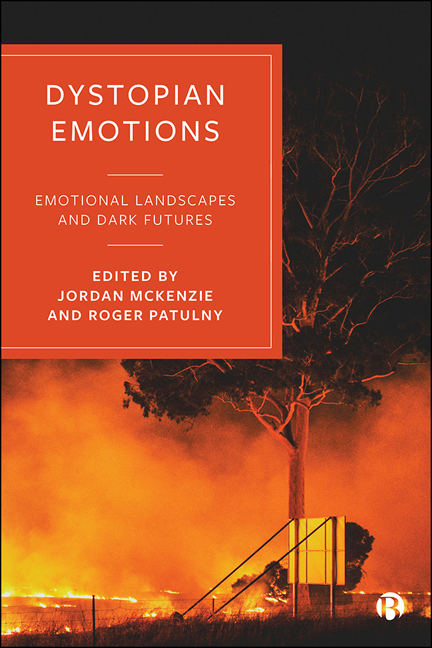Book contents
- Frontmatter
- Contents
- Notes on Contributors
- Acknowledgements
- Introduction: The Feeling of Dystopia
- 1 Borderland Emotions: A Case Study of Youths in Kinmen, Taiwan
- 2 Beyond Wicked Facebook: A Vital Materialism Perspective
- 3 Detangling Online Dystopias: Emotional Reflexivity and Cyber-Deviance
- 4 Mass Emotional Events: Rethinking Emotional Contagions after COVID-19
- 5 Between the Nationalists and the Fundamentalists, Still We Have Hope!
- 6 ‘The New Economy and the Privilege of Feeling’: Towards a Theory of Emotional Structuration
- 7 Neo-Villeiny University
- 8 Resuscitating the Past: Zygmunt Bauman’s Critical Analysis of the Recent Rise of Retrotopia
- 9 Hope Out of Stock: Critical and Melancholic Hope in Climate Fiction
- Conclusion: A Critical Mass of Emotions – Reflexivity, Loneliness and Hope?
- Index
8 - Resuscitating the Past: Zygmunt Bauman’s Critical Analysis of the Recent Rise of Retrotopia
Published online by Cambridge University Press: 13 May 2022
- Frontmatter
- Contents
- Notes on Contributors
- Acknowledgements
- Introduction: The Feeling of Dystopia
- 1 Borderland Emotions: A Case Study of Youths in Kinmen, Taiwan
- 2 Beyond Wicked Facebook: A Vital Materialism Perspective
- 3 Detangling Online Dystopias: Emotional Reflexivity and Cyber-Deviance
- 4 Mass Emotional Events: Rethinking Emotional Contagions after COVID-19
- 5 Between the Nationalists and the Fundamentalists, Still We Have Hope!
- 6 ‘The New Economy and the Privilege of Feeling’: Towards a Theory of Emotional Structuration
- 7 Neo-Villeiny University
- 8 Resuscitating the Past: Zygmunt Bauman’s Critical Analysis of the Recent Rise of Retrotopia
- 9 Hope Out of Stock: Critical and Melancholic Hope in Climate Fiction
- Conclusion: A Critical Mass of Emotions – Reflexivity, Loneliness and Hope?
- Index
Summary
Introduction
A spectre is haunting the world – the spectre of retrotopia. This would be a most fitting description of the message contained in internationally renowned sociologist Zygmunt Bauman's last book – Retrotopia – published right after his death on 9 January 2017. In this book and several others, Bauman, as we shall see throughout this chapter, laid the foundation for a critical sociological diagnosis of the times – an age by him characterized as ‘liquid modernity’. When Bauman died, he was known to be one of the most widely read and discussed sociologists in the world. Throughout his academic life, Bauman wrote about almost anything and everything related to the field of sociology. The scope of his work is almost unfathomable, the depth not less so. He was a generalist who with a keen iconoclast's eye observed and diagnosed the changes and transformations taking place in the Western world – and increasingly on a global scale – during his own lifetime. His work spanned almost six decades, thus bearing witness not only to social transformation but also personal development and maturation. Despite this long-stretched period of his writing career, there is an unmistakable consistency and continuity running throughout Bauman's work, a backbone, as it were, constituted by a strong moral sentiment and a commitment to human values. In the myriad of intellectual labels, epithets and boxes, Bauman can perhaps best be characterized as a humanistic sociologist (Tester, 2004), thus emphasizing that the plight of humans never escaped his attention, and he always imperturbably sided with the suffering human being in his work.
As mentioned, in his published work Bauman wrote about a mind-boggling variety of different topics: the working class, capitalism, communism, socialism, critique, culture, the Holocaust, the intellectuals, ambivalence, violence, freedom, ethics, community, communitarianism, modernity, postmodernity, liquid modernity, sexuality, surveillance, individualization, globalization, identity, art, consumerism, fear, love, work, the welfare state, poverty, morality, death, immortality, religion and so on. There was almost no area of our human being-in-the-world that seemed too trivial or irrelevant to him. Throughout his life and career, Bauman also concerned himself with the notion of utopia – and even though it remained a continuous yet submerged presence in his writings, at intervals he devoted specific attention to the topic.
- Type
- Chapter
- Information
- Dystopian EmotionsEmotional Landscapes and Dark Futures, pp. 139 - 158Publisher: Bristol University PressPrint publication year: 2021

